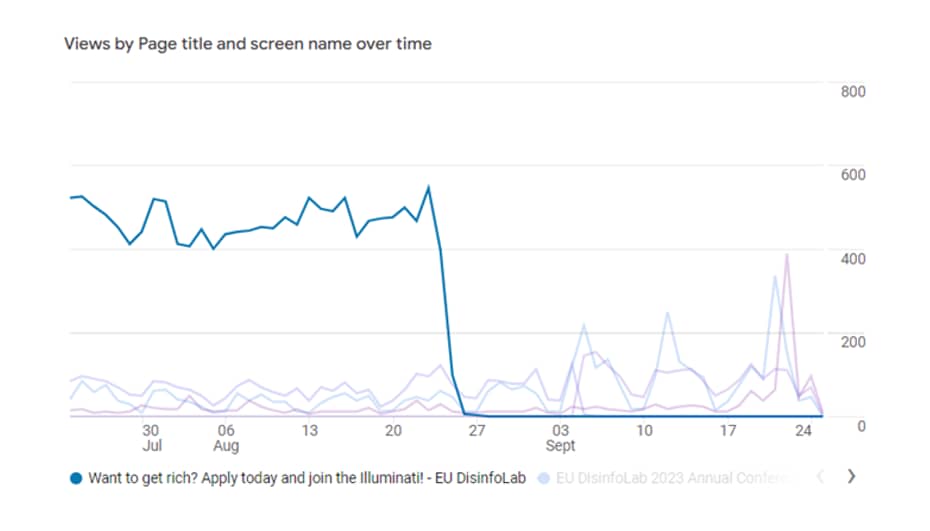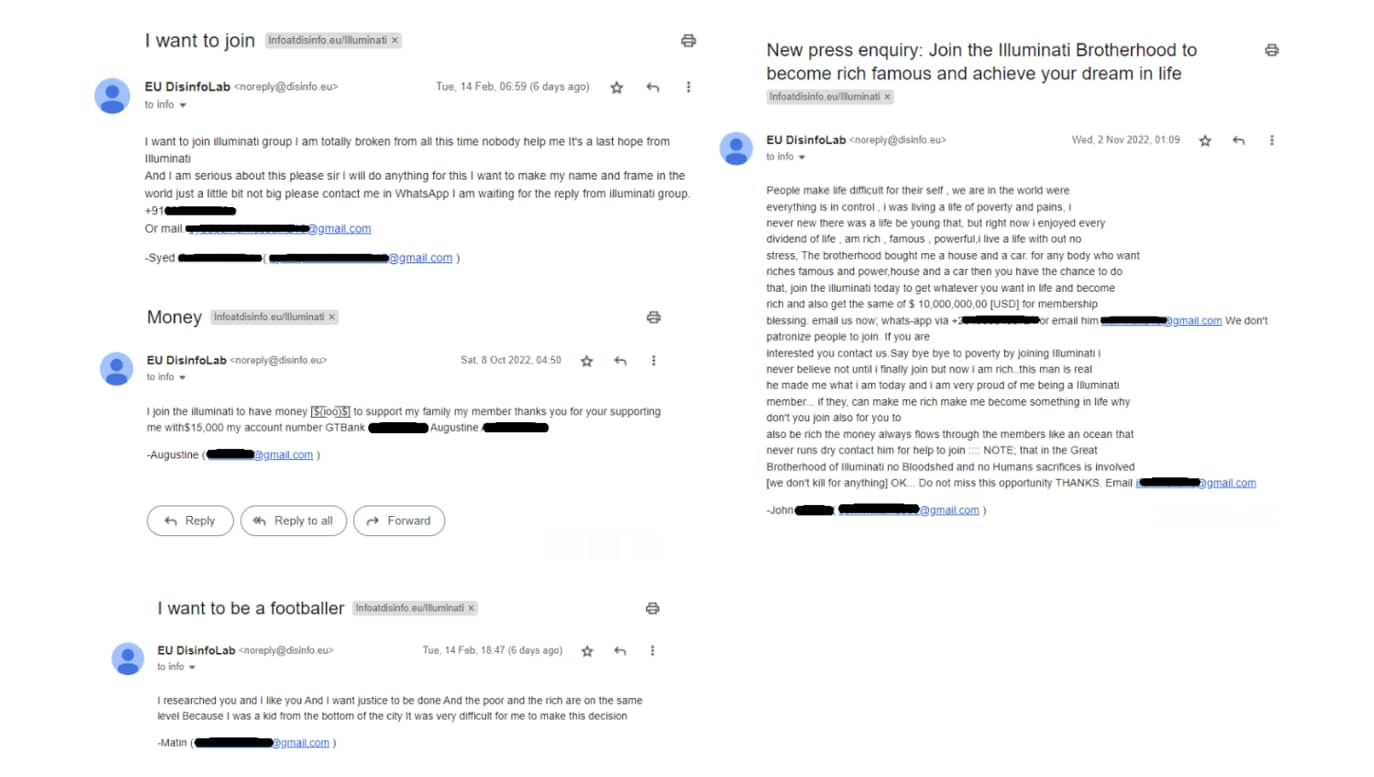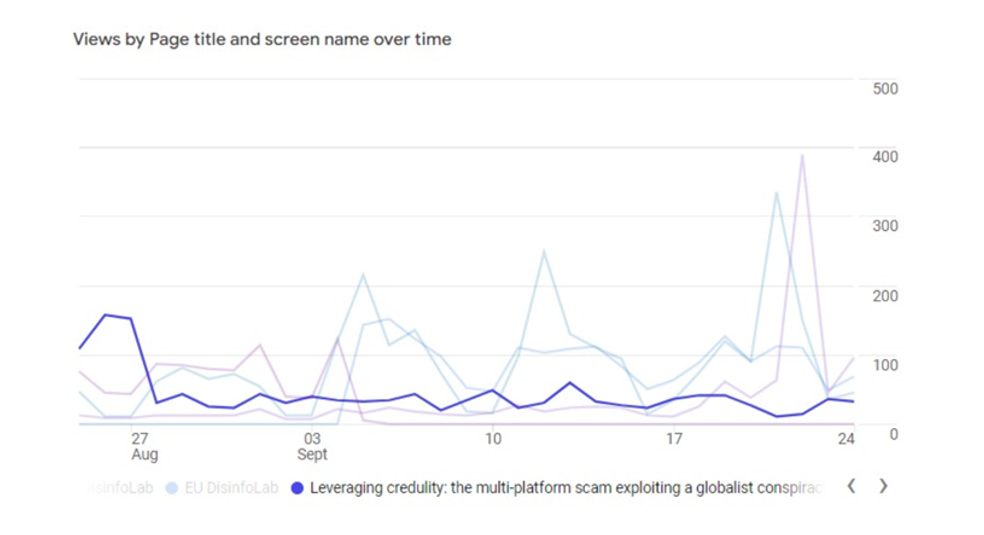Maria Giovanna Sessa, Research Manager, EU DisinfoLab
A little over a year ago, I co-wrote what turned out to be the most viewed (mind my words, not read) piece of research on the EU DisinfoLab website. You might think you are starting to get an idea of why I’ve been promoted.
The research identified online English-speaking groups across various social media platforms, which allegedly offered users the possibility of becoming members of the Illuminati secret society. Despite the contradiction, the payment of a membership fee would apparently unlock unlimited wealth. A collage of money piles, luxury items, stolen pictures from actual Masonic lodges, and public figures made the proposal even more tempting. A peculiar aspect is that while following the usual pattern of online scams, the fraud flipped conspiracy believers’ contempt for global elites to recruit them. If you can’t beat them, join them. Right?
Here’s some data. Since 31 May 2022, the blogpost is by far the most visited page on our website. Between 25 July 2023 and 25 August 2023, the article’s page received 13,768 visits (while our homepage got 1,954 visits). And it doesn’t end here. Ever since the study, we receive around 15 emails per day, and the languages used in these emails (mostly English but some in Arabic, Hindi, Gaelic, Spanish, Japanese, etc.) indicate an extensive global outreach.

However, this unexpected audience is reading and writing for all the wrong reasons: they ask us how to join the Illuminati! Some include poignant presentation letters explaining why they deserve to be rich and famous (get in line!). In doing so, they share personal information, including their full names, phone number, and bank accounts.

A few considerations to address this hilarious (and exhausting) misunderstanding that has been flooding our inbox is necessary, starting from a little mea culpa. Being fans of witty titles, the incriminated piece was headed by the words in block letters: “Want to get rich? Apply today and join the Illuminati!”.
Considering our previous study, we should have known better. When the receiver does not understand the irony in the transmitter’s message, then satire can become false information (sigh!). Andy Warhol once said, “I never read, I just look at pictures”, and we learned this lesson the hard way. All those eyes of providence screenshots in the text might have unintentionally tricked some into clickbaiting.
At least this is what happened until a month ago, when we decided to rename the blogpost, to avoid mentioning the word ‘Illuminati’. The word is still reflected in the URL, but it did the trick: visits for the page dropped to 926 from 25 August 2023 to 25 September 2023, and we received three contact emails in total (probably because the page with the previous title is still shared in some deceitful social media pages).

Researchers confirm that social media users repost articles without actually reading them, leading Twitter/X to introduce a prompt that encourages opening the article before sharing it. Similarly, dozens of users have scrolled down to the end of the page and found the “get in touch” box. For context, between 25 July 2023 and 25 August 2023, the average engagement time per session was 1 minute and 24 seconds. However, composing a written request demands more action than mindlessly clicking a button until an unread article is amplified on one’s profile. It is somewhat surprising that so many individuals could not recognise the scope of the organisation and understand the investigation’s content, but still managed to actively type a message filled with private information.
This experience awakens the eternal question of why people hold deceptive beliefs. Cognitive drivers include trusting one’s intuition rather than deliberation, neglecting the source or evidence presented, or familiarity with the imagery proposed. Get-rich-quick schemes prey on the victim’s emotional vulnerabilities and optimism bias. Interestingly, the anti-system sentiments that seem the lowest common denominator to these unsubstantiated convictions can be easily overturned with promises to let them in on the secret for a good life.
Let’s leave the conversation about why disinformation resists correction for another time. Still, a legitimate suspicion is that an explanation would simply convince these individuals that EU DisinfoLab is not the real deal, but there is a grand master around the corner ready to hand them the keys to a sports car. However, this only partially explains why our writing could be mistaken as part of the fraud we were exposing. Ultimately, this seems to be a problem of digital and media literacy, of having the tools (a technological device and an internet connection) but not knowing how to use them properly. Digitalisation does not necessarily come with higher levels of informational literacy. The topic becomes ever more sensitive when technology progresses but soft skills lag behind. This might be another speculation, but it appears more likely that these users have encountered our webpage by browsing for keywords rather than due to a shared social media bubble. So they know how to look stuff up, but not how to look into it.
Overall, it is disheartening that what we write is overlooked and misinterpreted to this point. It somehow reminded me of a social gathering where I was asked with a very serious tone whether EU DisinfoLab’s core business was in favour or against disinformation and why we weren’t called something like the “anti-DisinfoLab” (our haters can take notes). I wonder if employees of the National Depression Initiative or the Abandoned Children’s Fund ever get asked the same.
Anyways, we should probably take the hints, getting inspiration from the trend among malign actors to ask for financial support via crowdfunding or crypto-currency. Considering the funding hardships that we face as a non-profit civil society organisation (CSO), we might want to give in. We wouldn’t even have to change our name!


